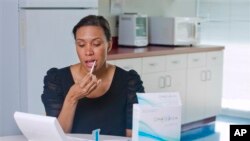Scientists have found that self-tests are generally accurate and could be an important tool in the fight against HIV.
A new review finds that self-testing kits for HIV, the virus that causes AIDS, are accepted by users. But they caution it’s still unclear whether self-testing will actually reduce the spread of AIDS.
Most HIV testing is done in a doctor’s office or at a clinic, where saliva or blood samples are taken and analyzed by trained medical technicians. But home testing kits have been approved or are under consideration in a handful of countries, including the U.S., Singapore, Kenya, and Malawi.
Dr. Nitika Pant Pai, of McGill University in Montréal, Canada, combined the results of 21 prior studies of HIV self-testing in what’s known as a systematic review.
She found there was widespread acceptance of self-testing. “People really wanted to. They accepted self-test, and they wanted to complete the self-test.”
Testing in a health-care facility has certain disadvantages. It could take more time, it might cost more, and it risks embarrassment and social stigma.
Self-testing may be more private, but it also has disadvantages. The test kits are made to be easy to use, but they involve taking a saliva or blood sample and carefully following instructions.
Pant Pai said an accurate result depends on following the procedure exactly. And that’s sometimes a problem.
"You know, it always helps to simplify instructions and give instructions ahead of time. And the instructions have to be tailored to the literacy levels of the population.”
The self-test kits are generally very accurate, especially when the test is done with some sort of expert supervision. However, these tests typically look for antibodies - the body’s defense against the HIV invader - rather than the virus itself. And because those antibodies don’t show up immediately after infection, there is a window of time when the test will come back negative.
“But if a person tests himself at 90 days, then the probability of getting a positive results, and a positive result really being a positive result, is really high, which is in the 99-100 percent range,” Pant Pai said.
Only one of the 21 studies Pant Pai examined looked at whether people who tested positive sought counseling, but in that study, 96 percent did. She says there is still a lack of data on whether the use of self-tests actually reduces the spread of HIV. “No, there isn’t any. The data on that is really limited, and those are the next steps that we need to take.”
Many of the studies of HIV self-testing asked participants how much they would pay for a self-test kit. The answers varied, but clustered around $10. Some were willing to pay more. In a study in Kenya, participants, who were health care professionals, generally thought the tests should be free.
A new review finds that self-testing kits for HIV, the virus that causes AIDS, are accepted by users. But they caution it’s still unclear whether self-testing will actually reduce the spread of AIDS.
Most HIV testing is done in a doctor’s office or at a clinic, where saliva or blood samples are taken and analyzed by trained medical technicians. But home testing kits have been approved or are under consideration in a handful of countries, including the U.S., Singapore, Kenya, and Malawi.
Dr. Nitika Pant Pai, of McGill University in Montréal, Canada, combined the results of 21 prior studies of HIV self-testing in what’s known as a systematic review.
She found there was widespread acceptance of self-testing. “People really wanted to. They accepted self-test, and they wanted to complete the self-test.”
Testing in a health-care facility has certain disadvantages. It could take more time, it might cost more, and it risks embarrassment and social stigma.
Self-testing may be more private, but it also has disadvantages. The test kits are made to be easy to use, but they involve taking a saliva or blood sample and carefully following instructions.
Pant Pai said an accurate result depends on following the procedure exactly. And that’s sometimes a problem.
"You know, it always helps to simplify instructions and give instructions ahead of time. And the instructions have to be tailored to the literacy levels of the population.”
The self-test kits are generally very accurate, especially when the test is done with some sort of expert supervision. However, these tests typically look for antibodies - the body’s defense against the HIV invader - rather than the virus itself. And because those antibodies don’t show up immediately after infection, there is a window of time when the test will come back negative.
“But if a person tests himself at 90 days, then the probability of getting a positive results, and a positive result really being a positive result, is really high, which is in the 99-100 percent range,” Pant Pai said.
Only one of the 21 studies Pant Pai examined looked at whether people who tested positive sought counseling, but in that study, 96 percent did. She says there is still a lack of data on whether the use of self-tests actually reduces the spread of HIV. “No, there isn’t any. The data on that is really limited, and those are the next steps that we need to take.”
Many of the studies of HIV self-testing asked participants how much they would pay for a self-test kit. The answers varied, but clustered around $10. Some were willing to pay more. In a study in Kenya, participants, who were health care professionals, generally thought the tests should be free.




